Pre-employment screening is essential for recruiters to find the best candidates. It helps identify the skills and qualities a hire will bring to your company.
This blog post compares Adaface and Testlify, so recruiters can understand the differences and choose the right tool for their hiring needs.
Explore this post with:
Table of contents
How does Adaface work?
Adaface is an AI-powered pre-employment assessment platform designed to help recruiters evaluate candidates across multiple skills seamlessly.
Recruiters use Adaface to create tailored assessments that match their specific job descriptions. The platform's scenario-based questions ensure that candidates are tested on practical skills rather than rote memorization.
Adaface is also popular for its customized question sets, which allow recruiters to add their own questions or request Adaface to design bespoke questions, ensuring a perfect fit for any role.
Adaface's conversational interface enhances the candidate experience by making assessments feel more like interactive sessions rather than traditional tests, setting it apart from other platforms.
How does Testlify work?
Testlify is a talent assessment platform that offers a variety of pre-employment screening tests tailored for various skills required in the workplace. By implementing these tests, organizations aim to simplify their hiring process and identify the best-fit candidates quickly.
The platform features adaptive tests that can be completed in about 30 minutes, making them low-stress and candidate-friendly. For instance, a software engineer might face a combination of coding challenges and situational judgment questions, allowing recruiters to gauge both technical and decision-making skills.
Testlify provides a rich library of tests including programming, cognitive ability, and personality assessments, making it suitable for diverse hiring needs. Additionally, it integrates with popular hiring tools, which helps maintain candidate records seamlessly within existing HR workflows.
However, Testlify lacks certain customization options. For example, it doesn't allow for the creation of highly tailored assessments based on specific job descriptions, which can limit a recruiter's ability to fine-tune the evaluation to their unique requirements.
Adaface vs Testlify: Test libraries
Adaface's test library is a treasure trove of over 500+ skills assessments, covering everything from coding to customer service. It's like a Swiss Army knife for recruiters, with customizable tests that can be tailored to specific job descriptions.
Testlify offers a range of pre-employment tests, including programming, aptitude, and business skills assessments. Their library includes ready-to-use tests and allows adding custom questions, but lacks job description-based customization.
Adaface's test library
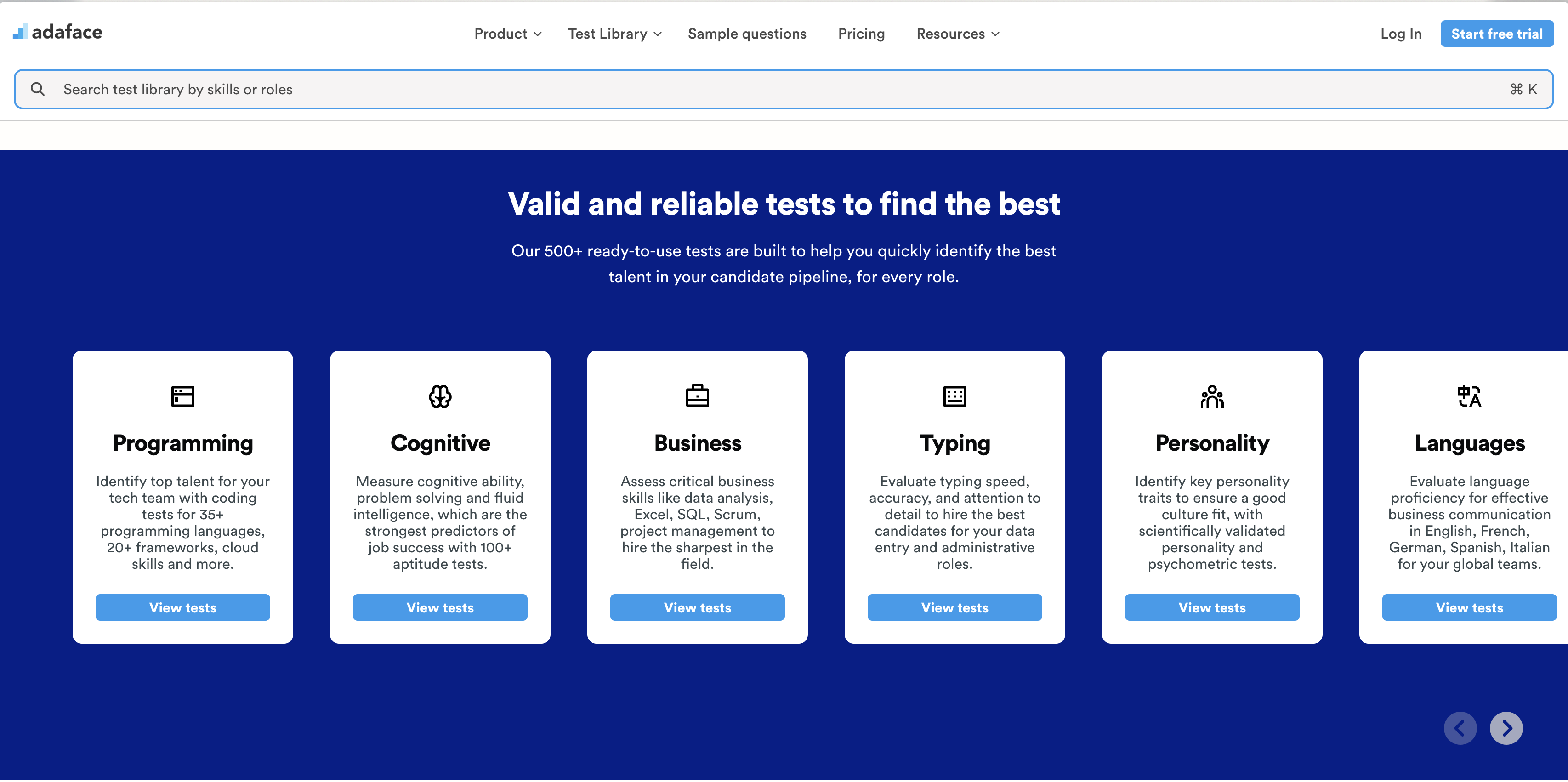
Adaface's library is a buffet of talent assessment tools:
- Programming tests with MCQs and coding questions
- Artificial Intelligence tests for data science and machine learning
- Role-specific tests for various job functions
- Cognitive ability tests to evaluate problem-solving skills
Recruiters love Adaface's library because it's like having a skilled interviewer in their pocket. It helps them quickly identify top candidates by assessing both technical skills and soft skills in one go, saving time and improving hiring accuracy.
Using Adaface's library is as easy as pie. Just pick a test, customize it if needed, and send it to candidates. The results come back faster than you can say 'You're hired!', complete with detailed insights to help make informed decisions.
Testlify's test library
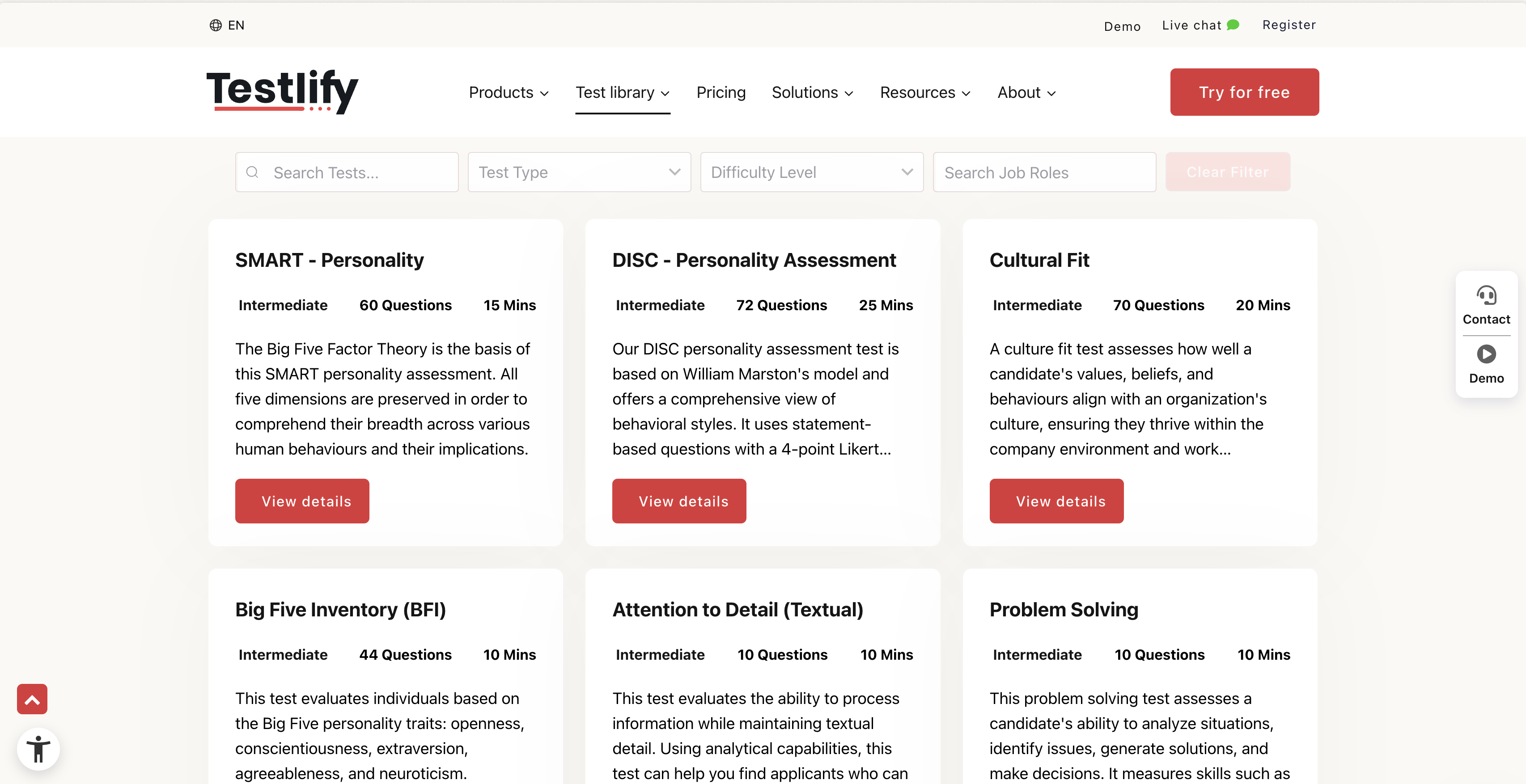
Testlify offers a diverse test library covering programming, situational judgment, aptitude, business, typing, personality, language, and finance tests. They also provide job-specific assessments and support for custom questions.
This wide array of tests allows employers to assess candidates on multiple fronts, making it a versatile tool for various hiring needs. For instance, a company can use Testlify to evaluate both technical and soft skills, ensuring a well-rounded assessment process.
However, Testlify lacks AI-specific tests and doesn't offer customized tests per job description, potentially limiting the precision of the assessments. Also, there's no support for creating a tailored test based on a specific job description, meaning employers might need to piece together multiple tests for a comprehensive evaluation.
Comparison of test libraries
Adaface vs Testlify: Business, Marketing and Ops Roles
Recruiters often use skills tests to screen candidates for job-specific roles to ensure they can handle the work they'll perform daily. It helps in identifying the best fit for the role by assessing practical skills relevant to the job.
Both Adaface and Testlify offer functionalities for screening on-the-job skills, featuring a range of tests. However, Adaface shines with its ability to customize tests based on job descriptions, ensuring a closer match to the role's requirements.
Business, Marketing and Ops Roles with Adaface
Adaface provides a comprehensive library of over 500 tests designed to evaluate various skills. Key functionalities include:
- Role-specific tests like business, marketing, and sales
- Programming tests
- Aptitude and Reasoning tests
- Language proficiency tests
Recruiters favor Adaface for its customizability and scenario-based questions that mirror real-life work situations. This approach helps in evaluating candidates' problem-solving skills and decision-making abilities effectively.
In addition to custom tests, Adaface allows users to add their own questions, providing flexibility and control over the assessment process. Features like the Microsoft Excel Test and Digital Marketing Assessment Test provide specific insights into candidates' proficiency in essential tools and skills.
Hiring Business, Marketing and Ops Roles with Testlify
Testlify offers a variety of assessments that cater to non-developer roles, including situational judgment tests and business skills evaluations. Their platform supports different types of assessments, such as aptitude and personality tests, making it a versatile option for employers looking to screen candidates in various fields.
One of Testlify's standout features is its extensive test library, which allows hiring managers to choose from a range of tests tailored for non-tech roles. For instance, candidates can be assessed on crucial skills like sales and project management, ensuring that you're getting insights into candidates' abilities relevant to the job at hand.
However, Testlify seems to fall short when it comes to customized assessments that align specifically with job descriptions. While they provide a solid selection of ready-to-use tests, the lack of tailored testing solutions means employers might miss out on evaluating the precise skills that matter most for their unique roles.
Adaface vs Testlify: Developer hiring
When hiring developers, you need to assess a candidate’s full range of technical skills to see if they align with your team and workload.
Adaface offers a tailored approach to technical assessments with a mix of coding questions, MCQs, and real-world scenario-based queries. Testlify provides a variety of assessments as well, focusing mainly on coding questions and framework-specific tests.
Hiring developers with Adaface
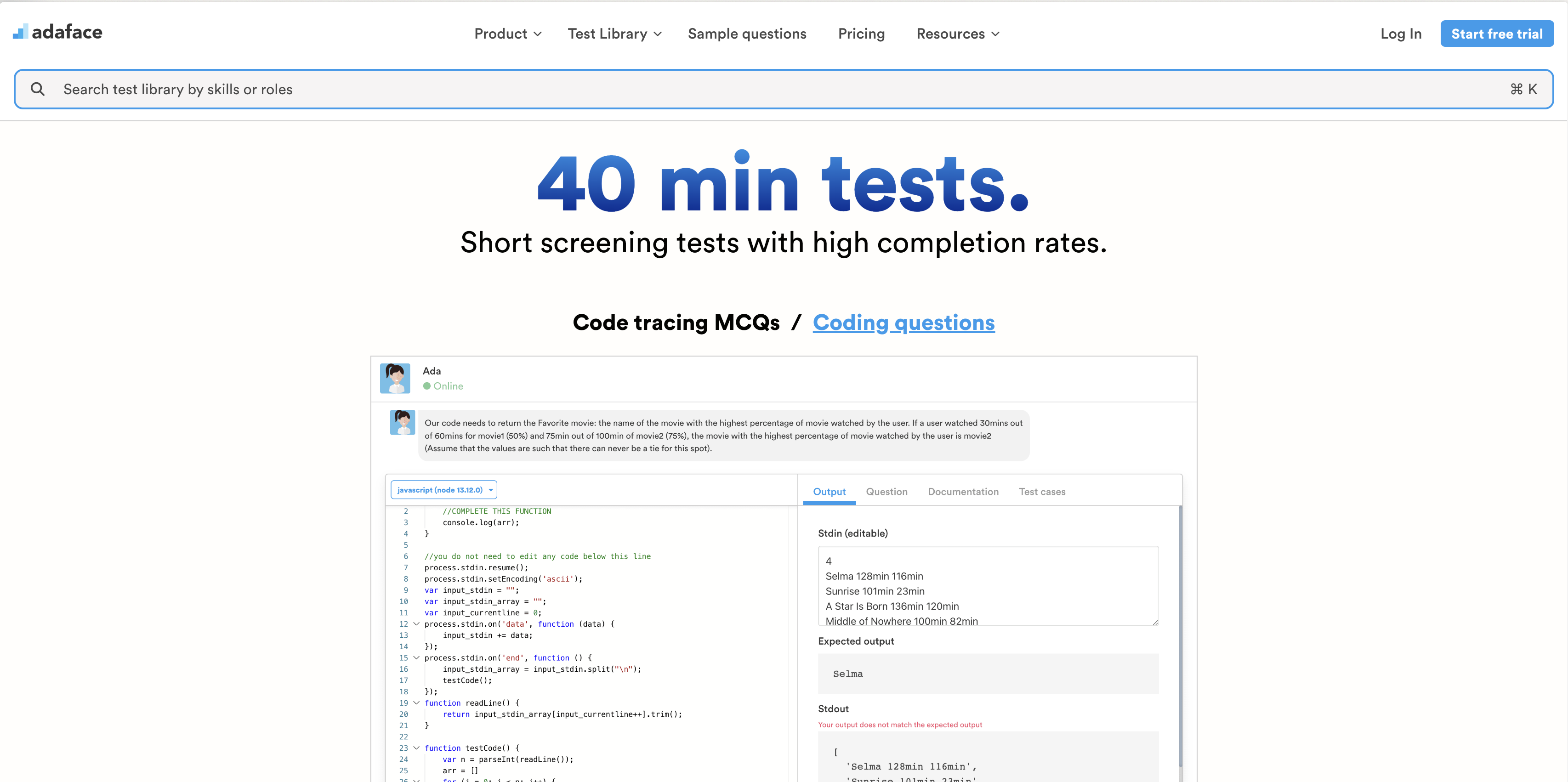
Adaface’s test library includes a wide array of functionalities for hiring developers:
Recruiters use Adaface to hire developers because it blends coding challenges with quick MCQs to give a balanced view of a candidate’s skills. This ensures a comprehensive evaluation without making the tests overly lengthy.
Additionally, Adaface allows recruiters to add custom coding questions specific to their requirements. This flexibility, along with features like code playback and automated scoring, makes it easier for recruiters to screen and hire top talent efficiently.
Hiring developers with Testlify
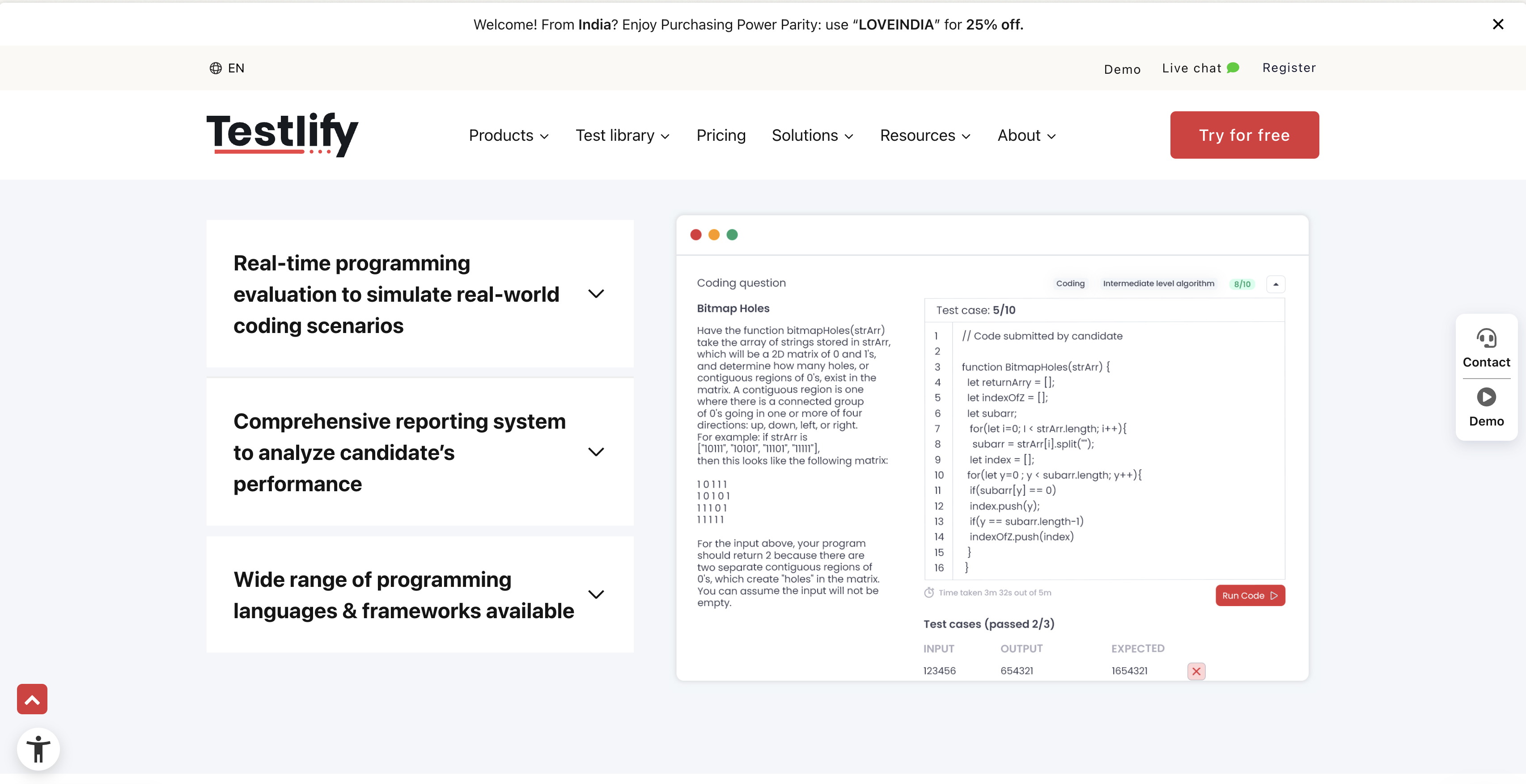
Testlify offers a variety of programming assessments, including questions on multiple programming languages, web frameworks, and mobile frameworks. This means that hiring managers can evaluate candidates on their coding abilities across different domains.
One of Testlify's selling points is its extensive test library, which allows employers to create tailored assessments by mixing coding questions and multiple-choice questions. This flexibility can help gauge both theoretical knowledge and practical coding skills, making it a decent choice for developer hiring.
However, Testlify lacks features like SQL coding questions and custom coding question creation, which could limit the ability to comprehensively assess candidates. Moreover, the absence of a code playback feature means hiring managers miss out on a deeper insight into candidates' coding processes.
Comparison of developer hiring features
Adaface vs Testlify: Candidate experience and company branding
Candidate experience can make or break your hiring process. A poor experience can lead to high drop-off rates and damage your employer brand.
Key factors that impact candidate experience include test length, ease of use, mobile-friendliness, and available support. Getting these right can boost completion rates and attract top talent.
Candidate experience and company branding with Adaface
Adaface offers a unique conversational interface that makes assessments feel less like tests and more like friendly chats. This approach helps put candidates at ease and showcases your company's innovative spirit.
The platform provides mobile-friendly tests, allowing candidates to complete assessments on any device. With email support, online help docs, and FAQs, Adaface ensures candidates have the resources they need for a smooth experience.
Adaface keeps test lengths to around 40 minutes - long enough to assess skills thoroughly, but short enough to maintain engagement. For enterprise clients, qualifying questions can be added to further streamline the process and improve the candidate journey.
Candidate experience and company branding with Testlify
Testlify offers a decent candidate experience with custom branding for pre-employment checks, allowing companies to showcase their logo and colors. Tests range from 10 to 30 minutes, and candidates have access to email support and help documentation for any questions that arise during testing.
One of the standout features is the ability to customize invitation and rejection emails, which can enhance the overall candidate perception of your brand. Imagine a candidate receiving a rejection email that's not just a generic template but something that reflects your company's voice; it’s a little touch that can leave a good impression.
However, Testlify lacks some features that could enrich the candidate journey. For instance, there’s no option for a conversational interface to make tests feel more engaging, and the absence of mobile-friendly assessments limits accessibility, especially for candidates on the go.
Adaface vs Testlify: Anti-cheating features
Online assessments are convenient, but they also come with the risk of candidates cheating. To ensure fair and accurate evaluations, it's crucial for assessment platforms to have robust anti-cheating features. This helps maintain the integrity of the hiring process and ensures that the right candidates are selected.
Anti-cheating features of Adaface
Adaface offers a comprehensive suite of anti-cheating measures to prevent any form of cheating during online assessments. These include:
- User authentication: Candidates must authenticate with their email before starting the test, preventing unauthorized access.
- Time limits and full-screen mode: Tests have time limits, and candidates are forced into full-screen mode, minimizing opportunities for cheating.
- Webcam and browser monitoring: Adaface tracks the candidate's webcam and browser activity, ensuring they don't leave the test window or receive external assistance.
- IP and device fingerprinting: Adaface logs the candidate's IP address and device fingerprint, flagging any suspicious activity or multiple candidates taking the test from the same location or device.
- Copy-paste protection and non-googleable questions: Copy-paste functionality is disabled, and the questions are scenario-based and not easily searchable on the internet, preventing candidates from sharing or looking up answers.
- Large question bank and multiple question sets: With a 20K question bank and the ability to create multiple question sets, Adaface minimizes the risk of questions being leaked or memorized.
- Plagiarism detection and social listening: Adaface employs plagiarism detection for coding tasks and monitors social media for any leaked questions, allowing for proactive measures to maintain test integrity.
Anti-cheating features of Testlify
Testlify provides multiple anti-cheating features such as IP tracking, screen recording during coding assessments, and user authentication. They also disable copy-paste functions and randomize the order of test questions.
These features are designed to ensure that the candidates take the test seriously and that their skills are accurately assessed. For example, disabling copy-paste reduces the risk of candidates sharing answers, and randomized questions help in minimizing the chances of question leaks.
However, Testlify lacks certain advanced proctoring measures. It doesn't offer device fingerprinting, full-screen proctoring, or ChatGPT protection, which can be crucial for preventing more sophisticated cheating attempts.
Comparison of anti-cheating features
Adaface vs Testlify: Pricing and free trial
When it comes to pricing for assessment products, recruiters should expect a range of options that cater to different hiring needs and team sizes. Most providers offer tiered plans, allowing flexibility as your hiring demands grow—this is where we shine!
Adaface pricing
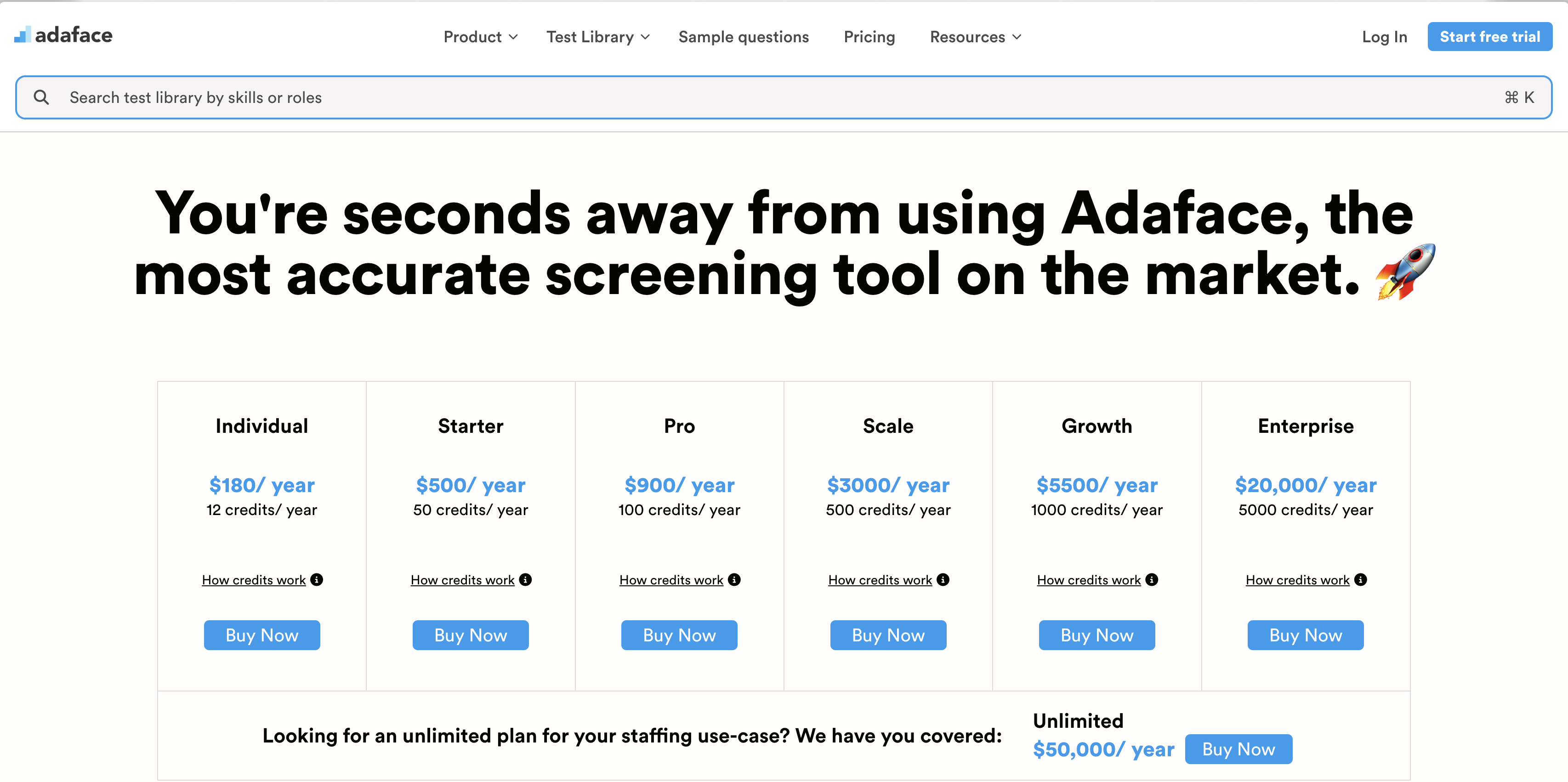
We provide a free trial with two sample tests and 5 credits so you can explore all features before making a purchase decision. The pricing is straightforward and designed to meet diverse needs. We offer several plans, starting with our Starter plan at just $500 for 50 credits, and scaling up to our Unlimited plan at $50,000 per year for those with high-volume hiring needs.
Here's a quick look at what we offer:
- Starter: $500 for 50 credits
- Scale: $3,000 for 500 credits
- Growth: $5,500 for 1,000 credits
- Enterprise: $20,000 for 4,000 credits
- Unlimited: $50,000 per year.
When choosing a plan, consider factors like your hiring volume and the number of candidates you'll be assessing. Our flexible pricing structure allows you to pick a plan that fits your needs without any hidden surprises. Explore our complete offerings and find the best fit on our pricing page!
Testlify pricing
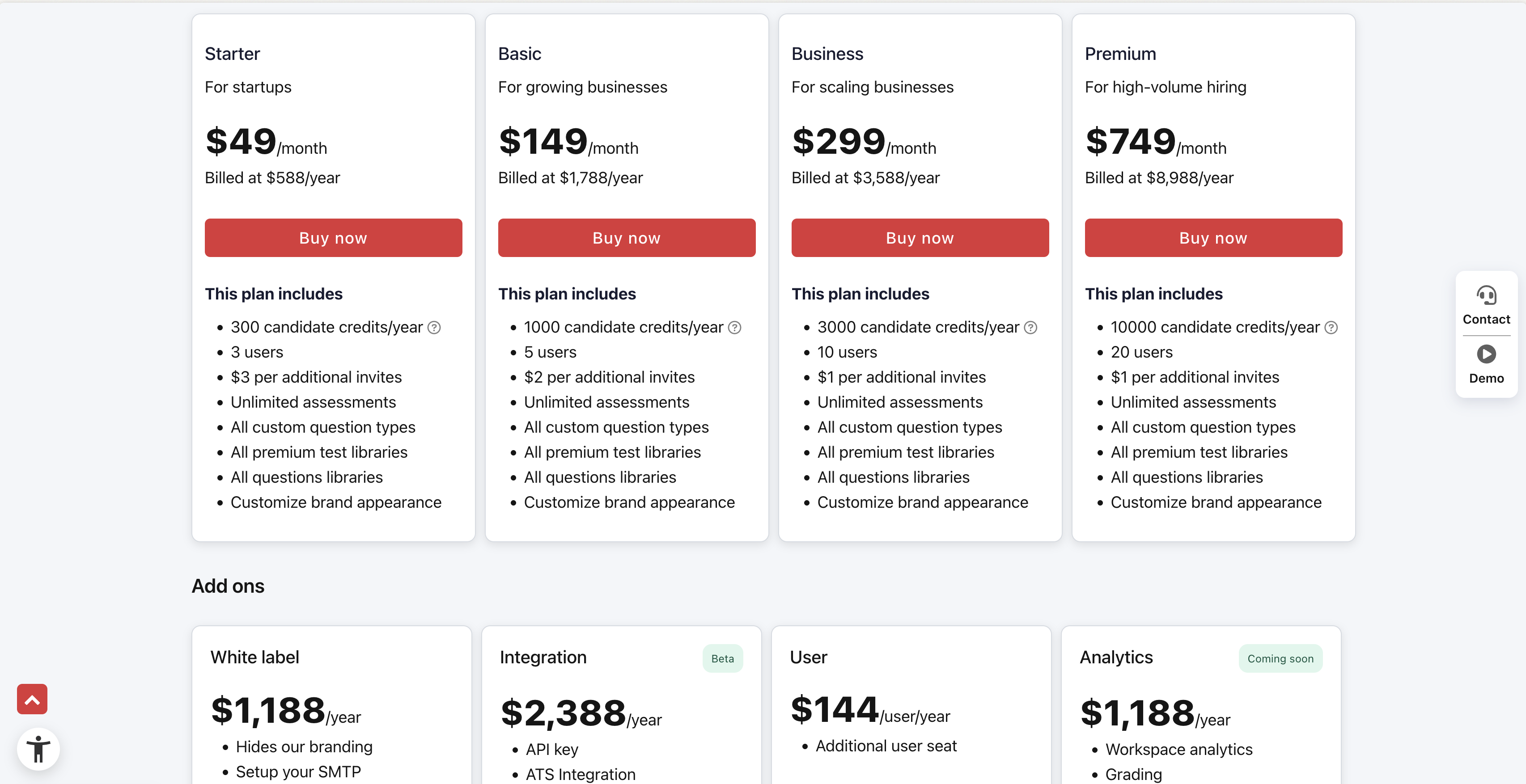
Testlify offers a variety of pricing plans catering to different business sizes and needs. Their options include:
- Unlimited Plans: Pricing varies based on employee count, starting at $699/year for small teams and going up to $34,999 for enterprises with 1000+ employees.
- Monthly Plans: Range from $99 to $1499 per month with varying candidate credits and user limits.
- Yearly Plans: Cost between $588 and $8988 per year, again depending on candidate credits and users.
Add-ons are available at an additional cost, but the complexity of choices might leave you pondering which one is just right.
While Testlify's pricing structure offers flexibility, it can be a bit tricky to navigate without clear guidance on which plan best suits your specific hiring needs. For instance, potential users may find themselves wishing for a straightforward way to explore all features during the evaluation phase, as well as insights into how many candidate assessments they might realistically need. This could make the decision-making process feel a tad overwhelming.
Comparison of pricing
Adaface vs Testlify: Scorecards, reporting and analytics
Scorecards, reporting, and analytics features are the secret sauce that turns candidate data into hiring gold. They help recruiters make sense of test results, compare candidates, and share insights with the team. A top-notch assessment platform should offer clear, detailed reports that are easy to understand and share.
Adaface scorecards, reporting and analytics
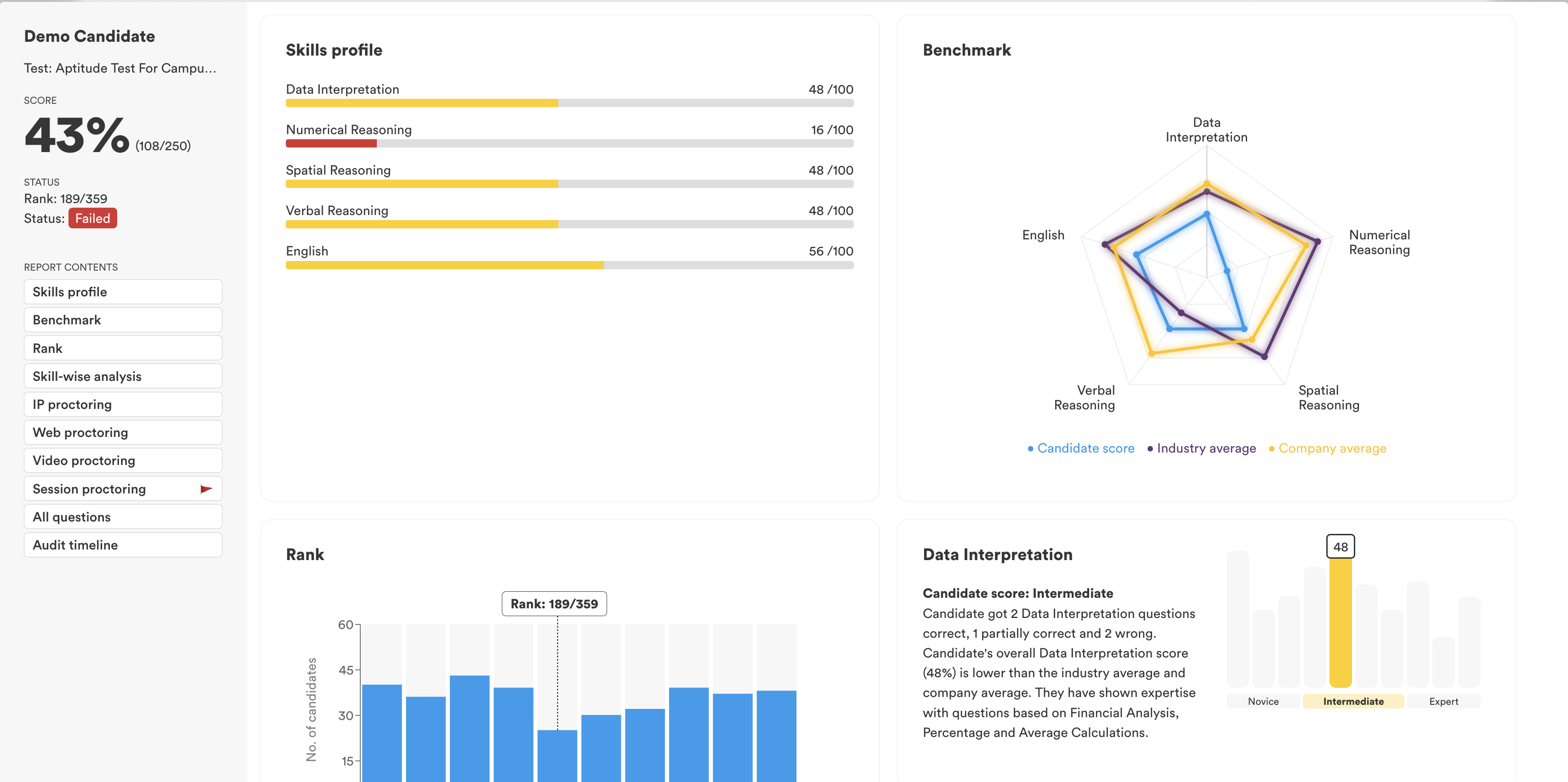
Adaface brings its A-game to the reporting party. It serves up PDF reports that are perfect for sharing with the team or clients. Plus, there's a neat trick up its sleeve - public reports. These are shareable links that let anyone view the scorecard without logging in. Handy for sending to clients who don't have dashboard access!
But wait, there's more! Adaface doesn't just stop at the basics. It offers a skills profile that gives you a quick snapshot of how a candidate performed in each skill area. And for the data nerds out there, you can export all this goodness in Excel and CSV formats. The cherry on top? A detailed audit timeline that shows all proctoring logs, so you can play detective if any issues pop up.
Testlify scorecards, reporting and analytics
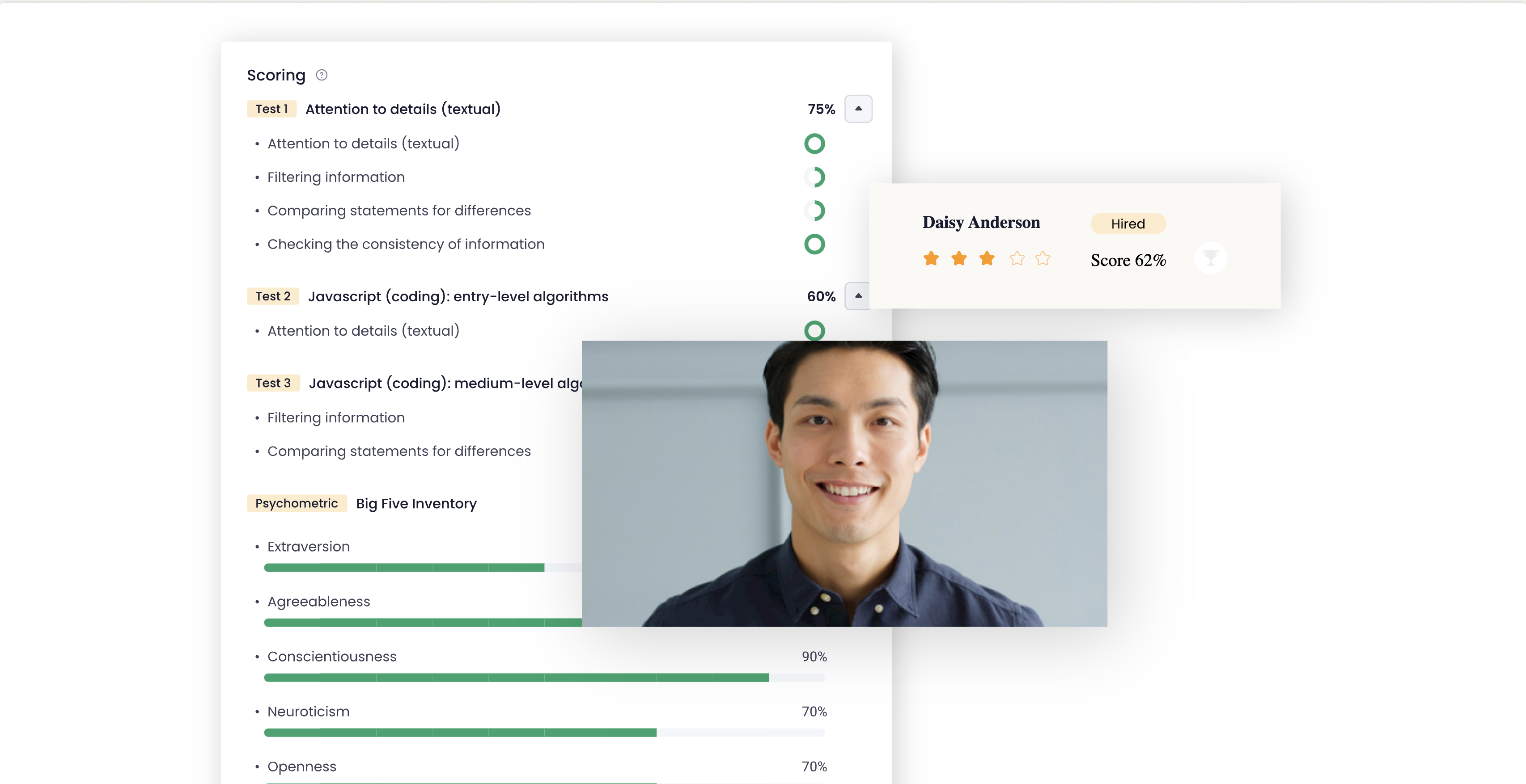
Testlify offers several reporting features that cater to recruiters' needs. These include PDF, Excel, and CSV report formats, making it easy to share and analyze candidate data.
Reports can be shared publicly via unique links, allowing those without dashboard access to view candidate performance. Additionally, automated scorecard generation and alerts help streamline the hiring process.
However, Testlify lacks benchmarking to compare candidates against each other and skill-wise analysis to break down scores by different categories. It also doesn't provide a detailed audit timeline for proctoring logs.
Comparison of scorecards, reporting and analytics
Adaface vs Testlify: Enterprise and startup friendliness
When choosing a pre-employment testing platform, look for features that support companies of all sizes. ATS integration, GDPR compliance, and API access are key for both startups and large enterprises.
Adaface's enterprise and startup friendliness
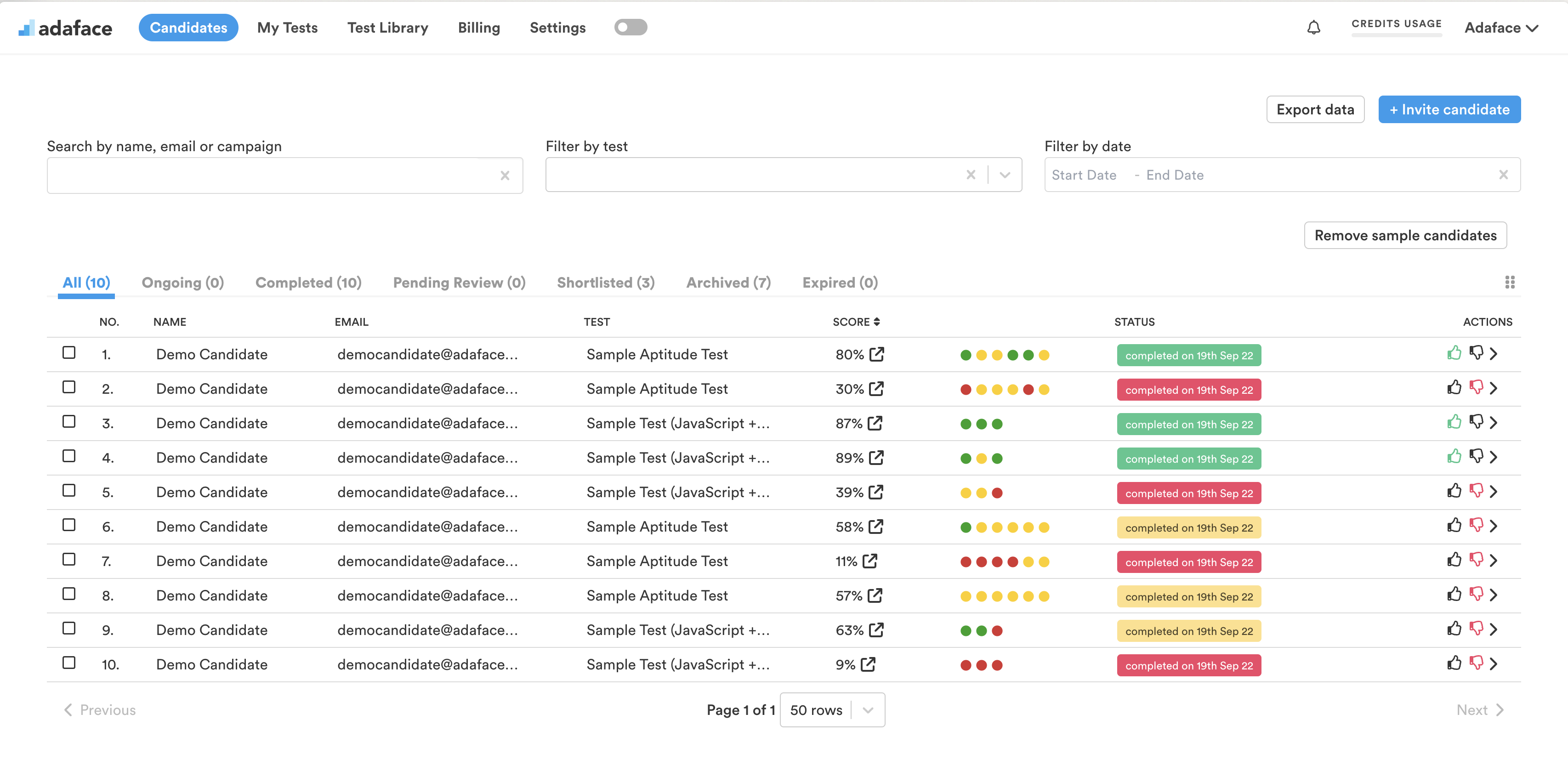
Adaface shines in enterprise-friendliness with its robust ATS integrations and GDPR compliance. The platform offers a custom API, making it easy to integrate with various HR systems and workflows.
For startups and growing companies, Adaface provides unlimited team seats across all plans. This allows small teams to scale their hiring without worrying about extra costs per user.
Adaface caters to high-volume hiring needs with features like multiple invite options, bulk actions, and multiple question sets. These tools help streamline recruitment processes for both campus recruiting and enterprise-scale hiring.
Testlify's enterprise and startup friendliness
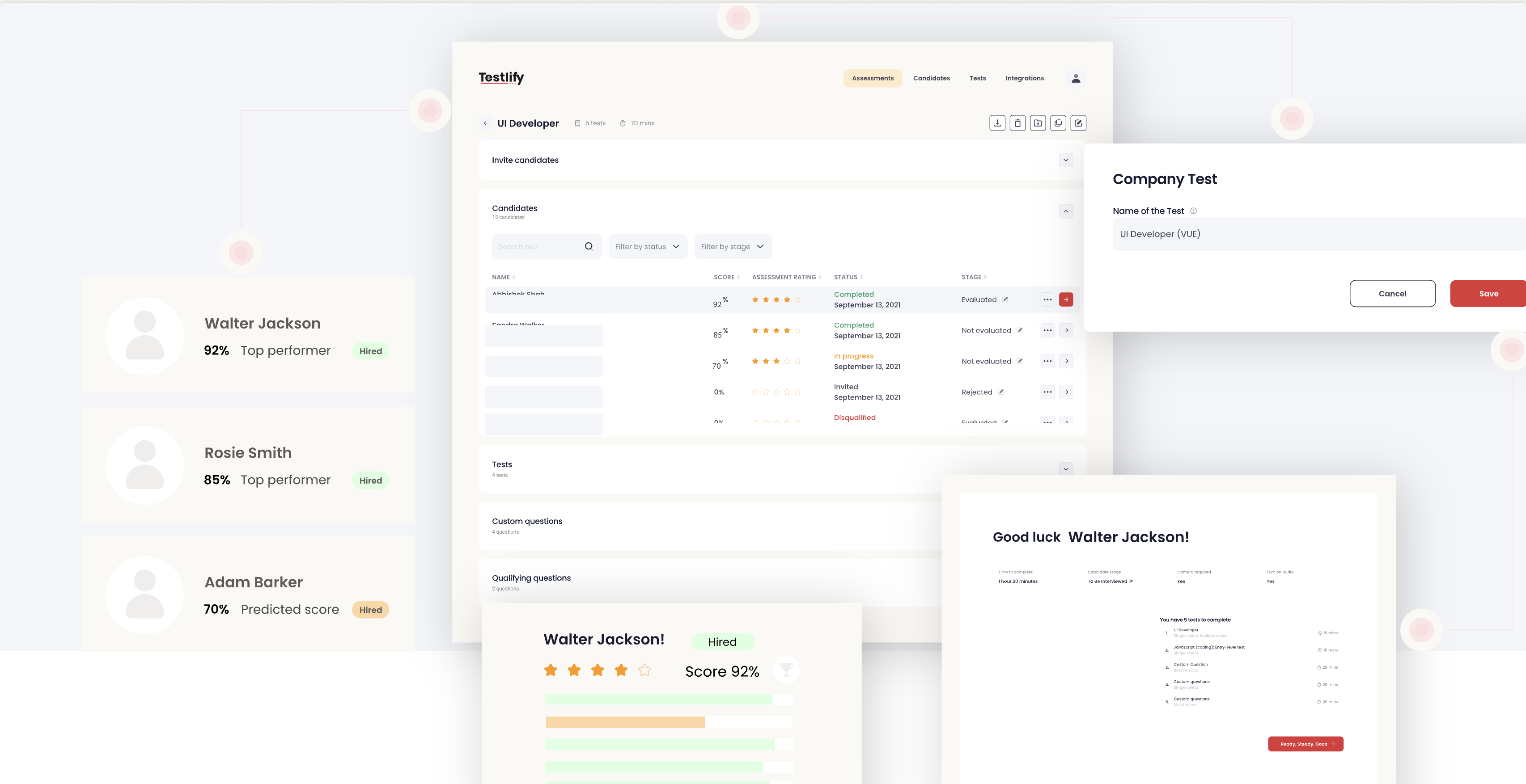
Testlify offers ATS integrations and GDPR compliance, catering to enterprise needs. It provides role-based access and multiple invite options for team management. The platform supports both startups and larger companies with its features.
For companies hiring at scale, Testlify's multiple invite options can streamline the recruitment process. This allows recruiters to send out assessments to numerous candidates quickly, potentially saving time in large-scale hiring events.
However, Testlify lacks some advanced features. It doesn't offer custom API access, bulk actions for mass hiring events, or multiple question sets to prevent test leaks. These limitations might impact its usefulness for certain enterprise-scale recruitment needs.
Comparison of enterprise and startup friendliness
Adaface vs Testlify: Assessment quality control
Quality control in assessments ensures that the questions are accurate, valid, and relevant, which ultimately boosts the confidence of recruiters in their hiring decisions. When assessments are reliable, recruiters can better identify top talent without second-guessing the results.
Adaface's quality control features
Adaface implements a rigorous quality control process before any question goes live. Each question undergoes thorough checks by experts to confirm that it effectively measures the intended skills.
Additionally, Adaface listens to candidate feedback and social signals to refine its question bank. This means that if a question starts to get leaked or seems too easy, it can be promptly replaced to maintain accurate assessments.
With proprietary algorithms in place, Adaface continuously monitors and enhances the quality of its questions. Recruiters can confidently rely on this data-driven approach, ensuring they have access to the best possible tests for their hiring needs. For more insights into how we design questions, check out our science page.
Testlify's quality control features
Testlify conducts extensive quality checks before tests go live. This ensures that the questions added to their platform are vetted and appropriate for assessing a candidate's skills.
However, Testlify does not replace questions after they have been overexposed. This can lead to familiar questions circulating often, which might affect the accuracy of the assessment.
Additionally, Testlify does not incorporate candidate or customer feedback to improve tests, nor does it use proprietary algorithms to enhance the quality of its question library.
Comparison of quality control
Adaface vs Testlify: Conclusion
Both Adaface and Testlify offer similar features like programming tests, situational judgment tests, and aptitude tests. They also support various business skills assessments.
Despite these similarities, Adaface stands out due to its custom test creation based on job descriptions, ensuring a more accurate assessment for specific roles.
Testlify lacks certain features like AI tests and custom coding questions, which are important for evaluating modern tech roles.
Streamline hiring with skill tests
Adaface provides these missing features along with a conversational interface and mobile support, making the candidate experience much better.
Pre-employment assessments offer a range of tests to evaluate skills, personality, and more, helping recruiters make informed decisions.
Using these tools can save time and reduce bias in the hiring process, ensuring you select the most qualified candidates.
Adaface emerges as a superior solution due to its comprehensive features and candidate-friendly approach. Learn more about Adaface's online assessment platform or explore our pre-employment blog for more insights.
Adaface vs Testlify FAQs
Adaface offers a more comprehensive range of tests, including AI, cloud, and customized tests per job description, which Testlify lacks.
Yes, Adaface supports both coding questions and scenario-based MCQs, providing a balanced assessment.
Adaface assessments typically last around 40 minutes, whereas Testlify's assessments range from 10 to 30 minutes.
Yes, Adaface allows you to add your own questions and also offers custom questions designed for specific use cases.
Yes, Adaface supports mobile-friendly assessments, improving accessibility for candidates.
Adaface provides robust proctoring features, including web and webcam proctoring, location logging, and more.

40 min skill tests.
No trick questions.
Accurate shortlisting.
We make it easy for you to find the best candidates in your pipeline with a 40 min skills test.
Try for freeRelated posts



